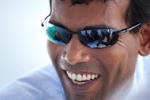Mohamed “Anni” Nasheed caught widespread attention when he held a cabinet meeting underneath the sea in the months leading up to the Copenhagen climate summit in 2009. He continued to captivate negotiators, governments, and climate advocates with his frank and outspoken demeanor, sometimes for better or for worse. As the President of the Maldives, one of the lowest lying nations in the world, Nasheed’s major objective has been to stop his country from sinking into the rising seas.
A new documentary, The Island President, gives audiences a rare look into the behind-the-scenes political struggles President Nasheed faced in the year leading up to the climate summit. The filmmakers capture Nasheed’s monumental task of wrestling major world leaders to agree to reduce their emissions for the sake of saving vulnerable nations from the onslaught of climate change.
Those who attended the summit will quickly remember the frustrating tension felt as the two-weeks rolled further and further into disappointment, eventually leading to Obama’s strong-arming on the last day of the conference. However, the film paints the outcome of Copenhagen in a positive light, focusing on the fact that countries came together to talk about the issue of climate change at all, instead of the massive failure that many remember it as.
“No, it was not the dramatic success that some had hoped it would be,” recalled director Jon Shenk, in an interview, “but there was something unprecedented that had happened, which was that this agreement got signed by all the countries stating that there is problem and we need to do something about it. From Nasheed’s point of view, it’s a start.”
But the film doesn’t just focus on climate change. It starts off with the history of social and governmental turmoil the country endured before Nasheed took the presidency.
Long before he was fighting the rising seas, he was fighting for civil rights and the restoration of true democracy as an activist and journalist. His activities led to to several years of incarceration, torture, and even exile before returning and replacing the previous dictator’s regime.
Combining these two themes puts light on a budding subject residing underneath the surface of the climate and environmental movements: sacrifice.
It’s admirable to watch and listen to Nasheed recount his experiences fighting for democracy and what some would consider massive consequences he had to pay before returning to the country to enable change. It makes one self-reflect, what sacrifices are we willing to endure to fix the climate?
As the movie follows Nasheed as he gains the presidency, we see him applying the skills of his past towards a new threat, climate change, one that had been, for the most part, faceless and abstract up until then (can you really demonize a carbon atom?). Nasheed changed that when he brought the set of tiny little islands to center stage. Shenk said,
“This is a kind of David and Goliath struggle. I see a guy who has is a has stayed true to his own vision, what he thinks right versus wrong is, and has been a tireless advocate for civil rights, freedom of expression, all the basic civil rights that the West enjoys. Trying to get that into his country, he extends that into the climate debate. The climate debate is ultimately about human rights.
“Right now we are making decisions, we are making decisions that are going to affect people 50, 100 years down the road. That’s a classic human rights struggle. In a way I just hope people see what’s it’s like to be a person who is trying to carry that fight on, and the strategy and passion it takes to do that.”
Unfortunately, last month on February 7th, Nasheed was forced to step down as president at gunpoint when supposedly loyalists of the previous regime staged a coup. His former vice president has since taken office.
The Island President is now in select theaters all over the country.
Subscribe to our newsletter
Stay up to date with DeSmog news and alerts






